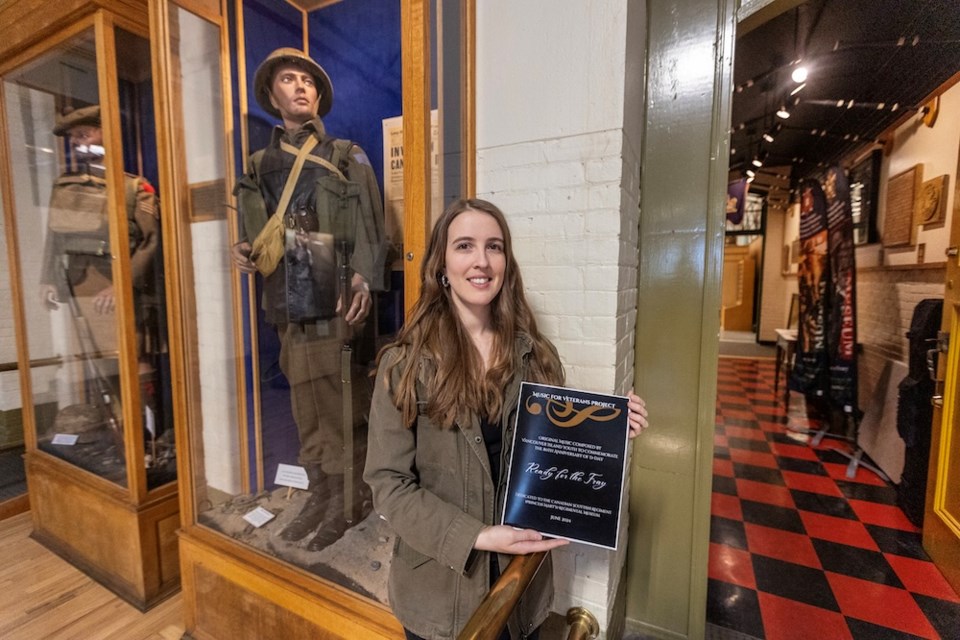Between football practice, schoolwork and all the other things a busy teenager has going on, Liam Ray took time to compose his own song for a young soldier he never knew.
He calls his three-minute piano piece Ballad for Seanmhair — grandmother in Scottish Gaelic — and it pays tribute to Ronald Cameron, who at 21 was cut down in the first wave of Canadians storming Juno Beach on D-Day.
Ray’s research found that Cameron, a Â鶹´«Ã½Ó³»truck driver who loved his work, was especially close to his grandmother and had talked a lot about her in letters and last wishes as his Victoria-based Canadian Scottish Regiment was preparing to invade Europe in the historic battle 80 years ago.
Ray, 16, said he wanted to capture the love that the young solider had for his grandmother, his connection to home and what he might be feeling getting ready for battle.
“It was tough to start,” Ray said in an interview after a football practice at Belmont Secondary in Langford. “But then it all just started to flow out of me. It was very calming, liberating. I’m very proud of this one.”
Ray is one of eight Greater Victoria piano students who have written their own piano compositions to honour soldiers from the Canadian Scottish Regiment (Princess Mary’s) who died during the D-Day landings along the Nazi-fortified beaches of Normandy on June 6, 1944.
The students, who are in Grades 6 to 12, will play their music during an open house at the Bay Street Armoury on June 1 as the regiment marks the 80th anniversary of the D-Day landings.
The Music for Veterans Project, founded and operated by Victoria piano teacher Emily Armour, is in its third year and connects students and members of the Canadian Forces in a unique and very personal way.
The project inspires students, who are given an information package on soldiers, to dig deep and pour their emotions over the keys.
“For them to form that music for a person they don’t know requires a lot of empathy and a lot of thought,” Armour said. “It’s beautiful when they are able to illuminate something with art and help everyone else relate and connect with it in a positive way.”
Armour, who had a grandmother and grandfather in the Second World War and whose husband served in Croatia, said the Armed Forces and veterans are often inaccessible to youth unless there’s a direct family connection.
“So when these students are composing music, they are trying to think about something that’s so much bigger than themselves,” she said. “The way I mentor them is the music comes from a place of respect and appreciation … and the results are always amazing.”
Almost all of Armour’s 30 students have composed music for the Music for Veterans Project, including a five-year-old. They’ve performed at Parliament in Ottawa before veterans, world embassies and national defence staff, and at Remembrance Day services in the capital region.
Karen DeMeo’s son, Marcus, composed a song called The Artist for Pte. Charles Frederick Young, who was 19 when he was killed on June 9 after the D-Day landing. His research found Young was a budding artist and left his benefits to a younger brother for a musical education.
“It a very personal creation and a lot of beautiful emotions come through,” DeMeo said. “All of the students are able to capture these special feelings… It really shows music transcends everything.”
Armour said she’s constantly surprised at what the students create.
“I’m always astounded by the depth that a lot of them go to when they are working on the music. I do think that having a purpose when they’re composing is very vital,” she said. “Anybody can write a piece of music, but to write a piece that is not about you, to think about others and to honour somebody that you don’t even know … that’s special.”
Armour said the project honours both active and past members of the Armed Forces.
She said a lot of the veterans and family members who receive music find it a very profound experience.
Ainsley McPherson’s piece, The Lancaster’s Flight, played during a Remembrance Day recital in 2021, was inspired by her grandfather and written for former air force captain Graham Hafey. He told CBC: “I’m known not to be an emotional guy, but that really moved me … I’m very deeply honoured by this, I’ve never had anything like this before.”
Another veteran with 30 years and five deployments in the Armed Forces told Armour he was humbled, saying: “You and your students have no idea how much this piece of music means to me, and I will use this gift to get me through some of the tougher days ahead.”
Armour said the aim is to take Music for Veterans across the country and get more music teachers involved.
She said her non-profit group and a board of directors will curate all the learning materials for instructors and help with organizing events and facilitate relationships with museums and other military organizations.
Randy Evans, director of the Canadian Scottish Regiment Museum at the Bay Street Armory, said the Music for Veterans program honoring fallen members of the regiment is “simply brilliant … what a way to honour these young men who died for their country.”
Victory in the Battle of Normandy came at a terrible cost as Canadians suffered the highest casualties of any division in the British Army Group during the campaign, according to Veterans Affairs Canada. On D-Day alone, 359 Canadian soldiers were killed and more than 5,0000 would die over the following two and a half months of fighting in Normandy. Another 13,000 were wounded.
For more information on the Music for Veterans Project, to go .
Open house
What: The 80th Anniversary of the Longest Day, D-Day
When: 10 a.m. to 3:30 p.m. on Saturday, June 1
Where: Bay Street Armoury, 715 Bay St., Victoria
Admission: Free



